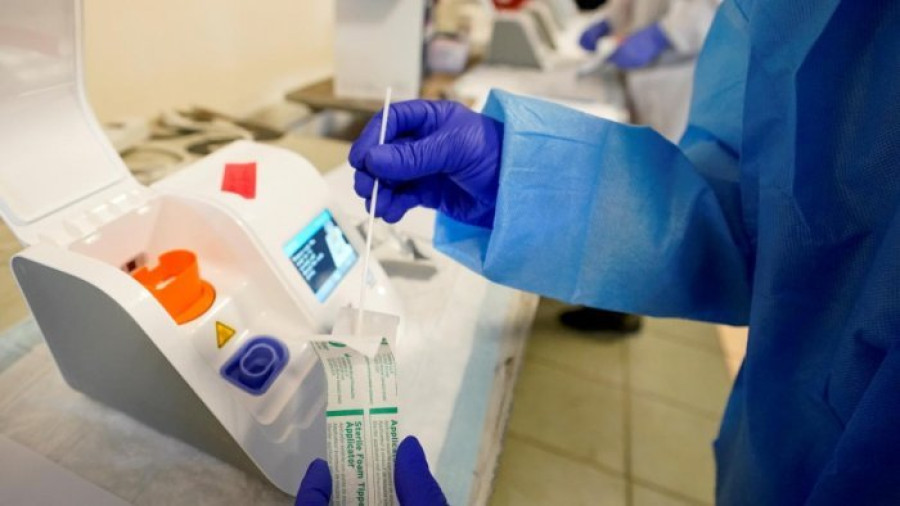Health
Health laboratory in Madhes Province begins whole-genome sequencing
With this, the number of labs with whole-genome sequencing capability has reached five in Nepal.
Arjun Poudel
The provincial health laboratory of the Madhesh Province has started whole-genome sequencing, which will help early detection of infectious virus variants, especially Covid variants.
“We have started carrying out whole-genome sequencing in swab samples of severe cases of Covid-19 patients at the provincial level,” Dr Shrawan Kumar Mishra, the chief of the laboratory, told the Post over the phone from Janakpur. “We will carry out gene-sequencing on a regular basis.”
Whole-genome sequencing is a comprehensive method of analysing the entire DNA sequence of an organism’s genes. Researchers believe that whole-genome sequencing of coronavirus could be instrumental in tracking the severity and properties of the virus.
The provincial health laboratory of the Madhes Province is the first laboratory having a whole-genome sequencing capability outside the Kathmandu Valley.
Along with the provincial health laboratory of the Madhes Province, the number of laboratories having the technology to perform whole-genome sequencing has reached five in Nepal. Until last week, just four labs in the country including a private laboratory, the Kathmandu University’s laboratory, Tribhuvan University’s laboratory, and the National Public Health Laboratory had the technology to carry out whole genome sequencing tests.
Mishra said that the provincial government supported the laboratory to purchase equipment to carry out whole-genome sequencing.
“We have acquired the same technology, like the one the National Public Health Laboratory has,” he added. “We purchased the equipment using the four million rupees provided to us by the provincial government.”
For the National Public Health Laboratory to start the whole genome sequencing, the World Health Organisation had provided a Nanopore DNA sequencing machine, which is small and cost-effective.
Officials said that the cost for a large-sized whole-genome sequencing could total around $500 per sample. The facility set up at the National Public Health Laboratory can perform the task at around $50 to $60.
The error rate of the Nanopore DNA sequencing is relatively higher compared to high-end machines. Officials said that the technology is internationally recognised.
According to Mishra, the provincial laboratory will carry out gene-sequencing on a regular basis and monitor the virus variants—not only of the Covid-19 but other viruses also—dengue, zika, chikungunya, HIV, hepatitis among others.
Of late, the infection rate of Covid-19 has declined throughout the country. On Thursday only 25 people (24 in PCR and 1 in antigen tests) tested positive for the coronavirus.
Experts stressed that even if new cases have declined significantly, authorities should keep the surveillance system robust to prevent possible outbreaks of new variants of the virus in future.
“With this technology, we will be able to check the variants of not only Covid-19 but also all other viruses,” said Dr Sher Bahadur Pun, chief of Clinical Research Unit at Sukraraj Tropical and Infectious Disease Hospital. “It is necessary to have such a lab in the Madhesh province, where the population is very high and thousands of people travel to India every day.”
Doctors say any virus seen in any corner of the world has the chance of entering Nepal. They said that having a technology to perform gene-sequencing helps to know the status of the virus which ultimately helps us in taking preventive measures.
Mishra, chief of the provincial health laboratory of Madhesh Province said that his office has requested for a membership of the national consortium of whole-genome sequencing.
Until a few months ago Nepal did not have whole-genome sequencing capability and the country would send abroad the swab samples of suspected Covid cases. The Ministry of Health and Population used to seek help from the World Health Organisation to send the samples abroad.
For lack of the technology in the country, it took over five weeks to know the cause of death of a 21-year-old man, who died of H5N1 infection in 2019.
The Health Ministry has also signed an agreement with the Public Health England for conducting whole-genome sequencing of SARS-CoV-2, which causes Covid-19.
As per the agreement, Nepal will send 150 swab samples every month for a year. Public Health England has agreed to perform the tests free of cost.




 13.16°C Kathmandu
13.16°C Kathmandu















